RECOIL OFFGRID Preparation Byron Rodgers: Experience is the Teacher of All Things
Estimates have put the number of new gun owners in 2020 to be somewhere over 5 million. In a time of growing threats to public safety and stigmatization of law enforcement, it’s finally dawned on many that protecting themselves and their family has never been more important. By the time you read this, the election will be over. No matter the results, increased instability will be par for the course. With the media, activist groups, and countless others fanning the flames of civil unrest, the next question becomes, who can teach you the skills to defend what’s important and the discretion to use them righteously? Guys like Byron Rodgers.
When you hear the term “executive protection” (known colloquially as EP), images might come to mind of some shredded guys with pressed suits, radio earpieces, and mirrored sunglasses following around celebrities who can afford the luxury of private security. Sure, Byron checks those boxes, but his résumé goes beyond protecting wealthy clients and teaching others who want to enter the private security industry. Author, veteran, podcast host, consultant, trainer, and creator of programs such as the Hard Skills Intensive and Protector Symposium are just some of the titles that make him as academic as he’s enthusiastic about helping everyday people help themselves.
The increased risks in our world have convinced many that being self-reliant isn’t only smart, but also imperative. Byron made it his mission to teach citizens from all walks of life how to sharpen the survival instincts that are part of everyone’s DNA. Think of him as part motivational speaker and part Roman general. We spent some time getting to know what motivated Byron to turn the skills he’s honed during his executive protection career into programs accessible to the average citizen.
RECOIL OFFGRID: Tell us about where you grew up.
Byron Rodgers: I was born in the Bahamas and grew up in Washington state. I spent the summers with my father in the Bahamas spearfishing, swimming, and doing all the island stuff, but I’d spend the winters with my mom in Washington, so I had a hybrid situation growing up. The Marine Corps brought me to Cali, and I opted for the infantry as an 0351. Then, from, there did my two deployments to Iraq.
In my spirit, I knew I was going to do what I ended up
doing in the executive protection industry, so I followed that inner voice. About three months before I got out of the Marines, I was working as a bouncer and was bussing tables just trying to be a good dude. This guy, Luke Agajanian, who became a buddy of mine looked over and told me to get a couple different permits, give him a call in a few weeks, and he’d show me how to make a lot more money doing what I was doing. That was the beginning of my executive protection career. Next thing you know, I was at a job interview in Beverly Hills talking to a client and away we went.
What was your experience in the military like?
Byron Rodgers: I was in for four years. It was like juvenile hall meets Lord of the Flies [laughs]. These guys had just gotten back from the battle of Fallujah. I got really good training, and my big brothers taught me how to fight. My first combat experience was very surreal. We were launching the invasion of Haditha, and we were out there at 3 a.m. It was pitch black, and I remember I was staring at the city and the power to the whole city just shut off. As we got ready to invade, an Army unit flew past us trying to get into the city first. We tried to tell them not to cross because there was a mine field. They went by us in a Bradley and got blown up. I remember hearing this explosion and hearing these guys and the rounds cook off. I was thinking, this doesn’t even look real. I heard this voice inside me say, you don’t really know what real is yet, son. [Laughs]
I was thinking, just grab yourself by the balls as we shot APOBS up into the city, which are linear explosive charges that shoot out on a rocket in a straight line and blow a trench in front of you. After that, the tanks trailed in that trench, and we ran in behind the tanks and invaded the city. We were going house to house to the sounds of women screaming, babies crying, and rock bands playing on big PSYOPS speakers. It was unlike anything else I’ve experienced. I got hit by a number of different IEDs, shot at by snipers, and it was a good taste of war. I got rocked a few times real good and had like an out-of-body experience and thought I was dead.
What got you interested in executive protection?
Byron Rodgers: Upon exiting the Marine Corps, I was at a crossroads thinking about what I was going to do. I knew I was trained to hold a gun for someone, so I wondered what my options were. I could contract overseas or be a cop. Those were the only two things I knew of. There was this scary period of life where like I had to make a decision, which is why, with my school, I try to make it as easy as possible to get into the industry because I want to pay that forward. Honestly, it was really the grace of God. After working as a bouncer at a bar for three months I got picked up and put on one of the most frequently traveling details in the U.S. I was 21 years old at the time.
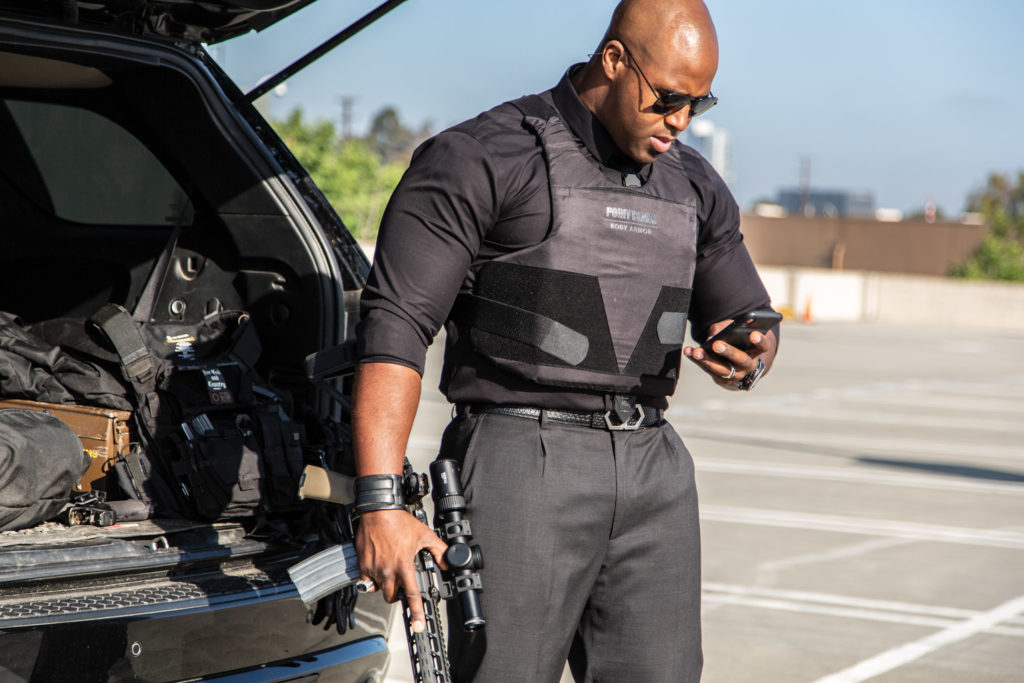
above: In this game you’ve always got to be ready, so Byron keeps all of his gear in the vehicle just in case he gets called to something he needs to move to on a moment’s notice.
When did you start your own company?
Byron Rodgers: During my first year, I was on the road a whole bunch. We were gone two to three weeks a month, and I needed a normal life. So, after doing that for seven years, living on private jets and stuff, I grounded myself with that client to only work for them when they were in California. I began working for about five local California companies. We call that “chasing the pager.” I was doing domestic security contracting where job offers would come and I’d sign myself up for the ones I liked. After doing that long enough to realize that I didn’t want to work for someone for the rest of my life and until I had enough of the right types of relationships and thoroughly understood the industry, I launched my company in 2017. Some professionals try to jump too quickly into having their own company, but personally it took me about nine years in order to do it effectively. Admittedly it was my second attempt, so I understand where they’re coming from.
What services do you and your company provide?
Byron Rodgers: We provide manpower and armed guard services for anything from various facilities all the way up to executive protection operations. We also do things such as penetration testing and have a pretty strong ability to get things done as far as cyber security and things on the tech side of the fence as well.
Do you work primarily with businesses, individuals, or both?
Byron Rodgers: Individuals, high-net-worth families, and churches/faith-based organizations for the most part, but it’s a mixture as well. We also have some businesses that hire us for guard services, which are more corporate. It’d be against the industry standard to name the names of my clients, but I can say I’ve worked the 2016 Presidential Inauguration, been in over 60 countries, and worked with every demographic that the industry has to offer. Everything from celebrities, politicians, royal families, A-list actors and singers, professional athletes, and even the transportation of valuable cargo all over the U.S. and internationally. I continued doing this for seven years straight, but now I still travel but I have more control over it.
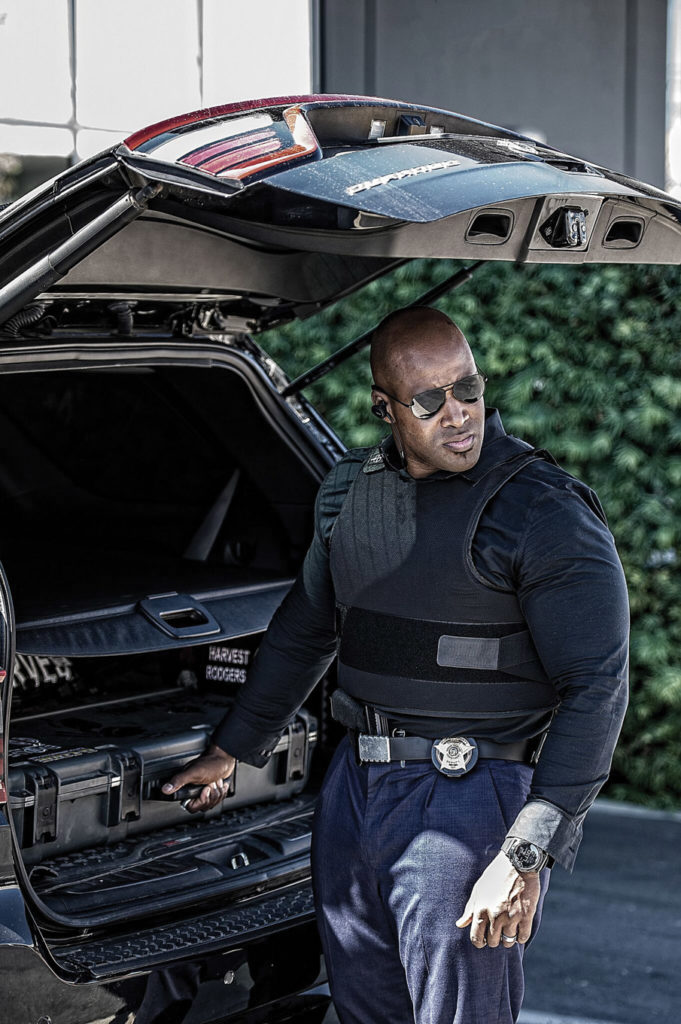
above: It’s important to make sure your skills and your gear are ready to work the full spectrum of the private security industry, because every call, gig, and mission is very different.
What are the main things your clients look for?
Byron Rodgers: It may sound a little counterintuitive, but professionalism and brand equity. For example, does the security product that we’re rendering add to their brand equity or subtract from it? Externally, as people are on the outside looking in, I notice the clients are very concerned with the look and feel, and the way they want to relate to the world. I find that to be one of the most anchoring principles when it comes to staying in a relationship with clients. The other thing is that I’m very relationship-centric. I’m focused on creating a long-term relationship with the client. As they change, I can change. Those things have really paid off.
Can you tell us about any close calls you’ve had?
Byron Rodgers: In the Dominican Republic, we had an issue where fake police were trying to pull us over. Fortunately, my local guys recognized it and stopped it from happening. They rammed the cop cars and pushed us around the barricade that they had set up for us. In that country, kidnapping is very common. Families even have kidnapping funds set aside.
Another time, we had a situation in the Congo where I found myself in a room full of local money. Piles of money, all over the floor, there were black bags full of it we were dealing with. We were trying to organize my client’s move and that cash. He was in another room. Our police escort was supposed to be guarding this place for us. There were no blinds on the windows, just these torn curtains. Our escort was looking at us in this room counting the money, and I was thinking, this is not good. The cops were staring at us, and people started gathering around the room.
We evacuated the client, but ended up leaving most of the money there. We had to do what we call “manning the rails,” fight everyone off the car, and get to the airport where the security was basically 14-year-olds with AK-47s. We rolled up to the FBO (flight base operations) and about every 30 minutes the FBO was coming up with new charges. Like, “Hey, you need to pay us the $250 airport tax.” And then 20 to 30 minutes later, there’d be another, like we needed to pay $250 for some other BS they’d make up. The pilot told them we weren’t paying any more money, they told us we couldn’t take off, and we were getting the flight handler on the phone.
This went back and forth for a while, and the pilot just said to buckle up because we were taking off. We just left, and they were on the radio yelling at the pilot and threatening to shoot him down and then he yelled back at them that they didn’t have an air force [laughs]. Boom, we were gone. That was definitely a situation where I was wondering what was going to happen. From the moment we realized there was trouble starting, getting to the car, fighting through the crowd, navigating to the airport, dealing with the airport, it was a wild ride for sure.
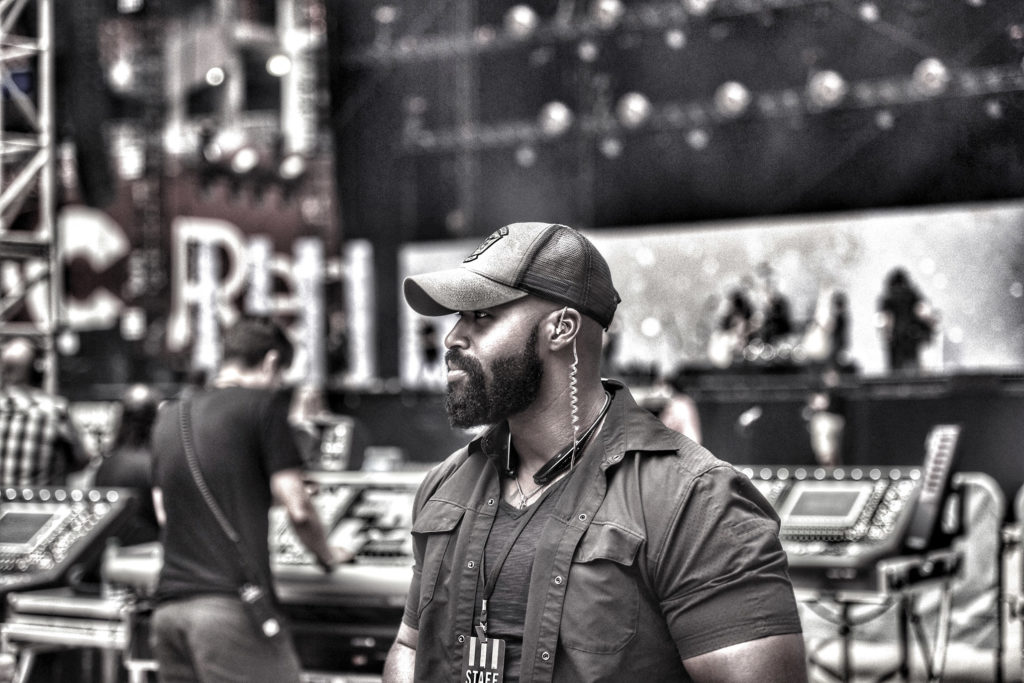

Above: Understanding the micro and macro components of running venue security is foundational, but make no mistake, you’ll need much more than just security skills in order to navigate these sophisticated social environments.
Has the executive protection landscape changed much from when you first started?
Byron Rodgers: Quite a bit actually. When I first got started, it was like you don’t get in unless you know someone. It was ultra-secretive and very tight-lipped. Things have changed exponentially because there’s been a ridiculous amount of growth because of things taking place in American culture. There’s more danger, there’s riots, human-threat scenarios with active shooters, so America is seeing more of a need for higher levels of security. Simultaneously there’s a war that’s been launched on law enforcement. With corporate America, you’re seeing a lot more companies bring a security element or department in-house. So, there are a lot more job opportunities where you can get full packages with stock options and make six figures. It’s a legit career field.
When I got in it you just happened to be that 1 percent like the Special Forces, NFL, or major leagues. There was no healthcare, no nothing. You did the job, got paid, that was it. You were an employee with a weird classification. Now, it’s so much more robust. There are huge companies that’ll hire you that do just executive protection and will find you work. When I started, you had to find your own clients. Networking can be done digitally as well now, and it’s a huge force multiplier for finding opportunities and getting inbound.
What do you think the keys to being successful in this industry are?
Byron Rodgers: Social dynamics, emotional intelligence, and the ability to plan/logistical intelligence. You need the social intelligence in order to navigate the environment you’re in, such as the client’s world. You have to navigate the “royal court,” which are the relationships around the client. You also have to navigate team life, the house staff, and the business owner or person who hired you. Handling any of those relationships incorrectly can be devastating — this is one of my favorite subjects to teach and one of the primary reasons I believe I’ve been successful. I’ve never been the biggest, baddest, or the best, but I’ve always been relationship-centric and have gone through pains to rigorously maintain humility to the best of my ability.
As far as growing your brand and achieving career success, managing relationships with other professionals is your number-one tool for attracting opportunity. Hard skills may save lives, but soft skills will keep you in the game. Understand the power of cooperation — it’s the key to unlocking a powerful team, not only in this game, but in life I believe. Every member must come from a place of selflessness putting the team over one individual because it makes all of you stronger. One really good guy by himself is actually a very weak target. We see this in nature — it’s the survival of the pack that’s actually the strongest and not necessarily survival of the fittest. Competence, trust, selflessness, and initiative are values that I believe make an amazing team, but like many things in life, these steps are simple to understand, but difficult to implement among multiple personalities.
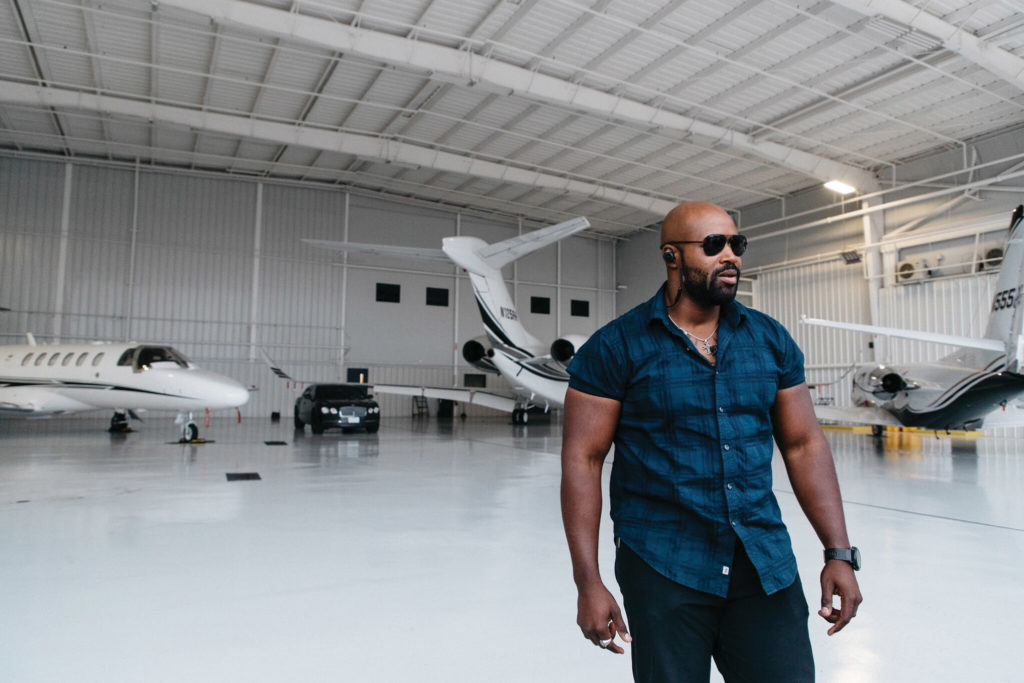
Above: Flying in private jets and staying at seven-diamond hotels is part of the job test, but so is managing your ego. A good agent knows to never let the client lifestyle become his own identity.
What do you think the most misunderstood parts of this profession are?
Byron Rodgers: We get a lot of really high-power dudes in this industry who think it’s going to be about combatives and tough-guy stuff. It’s really about social dynamics, customer service, and facilitating trips and movements in the safest manner possible. It’s extremely preventative. A lot of guys find it boring or insulting, like, “Hey, I’m not your coffee getter. Or, “I don’t carry bags.” Maybe in the State Department that works, but in the private sector you’ll just get fired, and they’ll find a guy who can carry bags and protect them.
If you’re with a high-power client with a lot of weight to throw around who has their own private jets, you might start to think you’re the man, but it’s not really any running and gunning. There are always the flavor-of-the-month guys who think they’re the most gangster EP agents ever and gonna change the world, but then they run out there and fall on their sword very quickly.
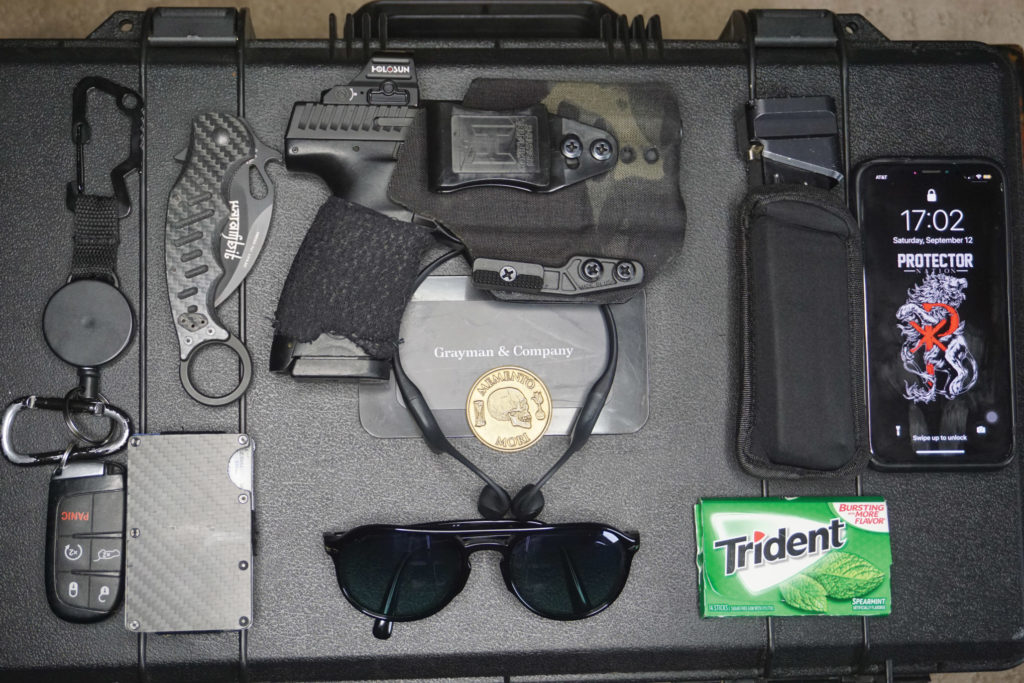
Do clients often have expectations of you that don’t align with what you need to do to protect them?
Byron Rodgers: Clients frequently hinge in the realm of ridiculous and unrealistic, but possible for a billionaire. That’s another thing that causes a lot of stress and cognitive dissonance — some guys are like, “Who do these people think they are? Do they think I just have this in my back pocket? Like we can just make this happen; they can just change their minds, and we can just ruin all of our planning?” They get wrapped around the axle and lose perspective.
You’ve got to remember, we’re dealing with billionaires who can have almost anything they want, whenever they want. If you can’t deliver, even though they change their mind at the last minute, in their world there’s something wrong with you and they can replace you by tomorrow. So, you get inoculated when you’ve been in this game for a while to dealing with the whims of turning water into wine, spinning straw into gold, and doing a number of things that are not executive protection-centric. It’s stuff like walking the dog, putting the car seats in the car, or looking for certain types of foods at 1:30 a.m. To the client, when they want something, they might think that you’re there for that and they just tell you to go do it. If you’re there in a secure position, or you’re the only one, you find yourself having to make certain choices, moves, and plays sometimes.
You might be in a jet where the client is like, “Hey, let’s go to the Canary Islands real quick!” They’re excited. Well, you’ve got to be excited too even though you didn’t do any planning. You know that if there’s no place to stay, or the travel department can’t get this thing linked up quickly enough because you guys are landing in an hour, it’s going to be your fault by the time you hit the ground if this stuff isn’t done and the client can’t show up to a nice rental car and ride off to the hotel on par with their standards. You’re dealing with a fast-paced game, and you really separate the plan makers from everyone else. Those people who know how to flow with the client, not be stressed out, and field all these requests are the ones who succeed. We call it The Truman Show sometimes [laughs].
Where can people get formal training and education if they want to work in executive protection?
Byron Rodgers: There are many schools out there, but I believe my course is the most effective tool to educate and get someone into the field of executive protection right now that I know of. You can learn from the comfort of your own home; you don’t have to stop working. I’ll teach you executive protection, but also branding, marketing, how to do your résumé, etiquette, social dynamics, and professionalism relative to the industry. And then I teach skills like how to do walking formation, vehicle-mounted operations, how to work in venues, hotels, site-based operations, how to work on private jets, etc.
I take students through the executive protection curriculum after all the things I didn’t see at most other schools. Beyond that, they become part of the League of Executive Protection Specialists, which is my group of graduates who I do weekly Zoom meetings with that I coach, so you basically have an executive protection consultant for the rest of your career. We have a group who shares opportunities and are hiring each other, so it’s a very positive place that’s helped a lot of people.
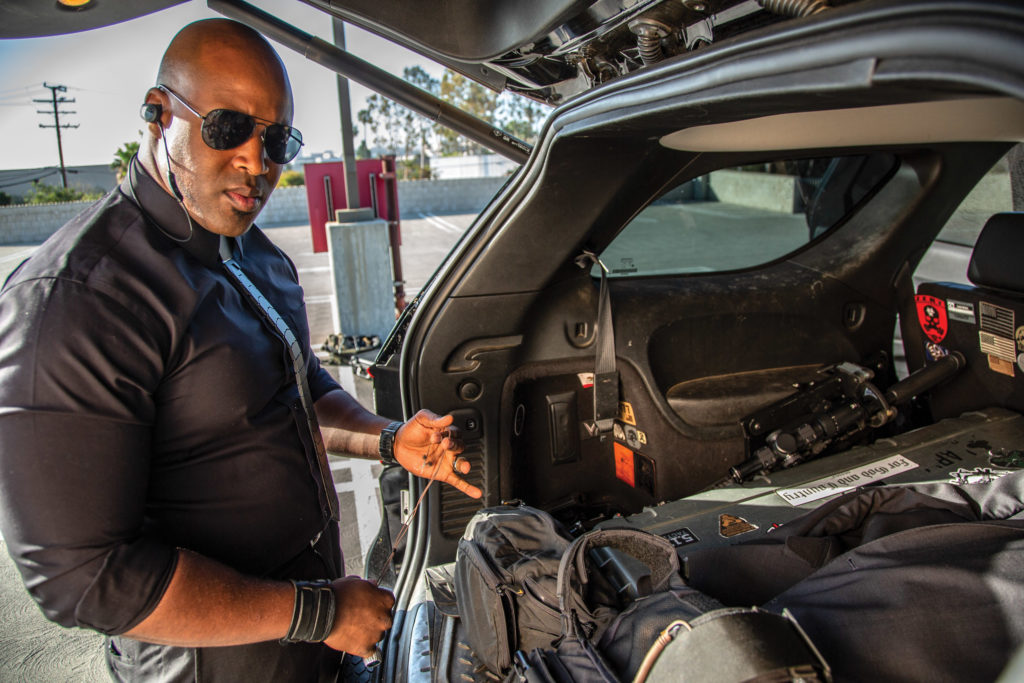
Above: “I’m not the biggest, baddest, or the best … I’m just a man willing to fail in front of you while trying to make a contribution to the industry I love. And if I succeed, it’ll be by God’s grace.”
If people are looking to hire someone for executive protection, how would you recommend they vet those individuals to make sure they’re legit?
BR: That’s very difficult because you might not know what to look for. If you don’t have the eye to recognize those types, it’s tough. I’ve run across so many clients that are relieved to have a competent team of professionals with them because they’ve had so many unprofessional people work with them in the past. When it comes to vetting people, there are a lot of imposters out there with a good song and dance who can make things look really pretty. I’d say talk to previous clients or employees — that’d be a good way to find out what they’re really all about.
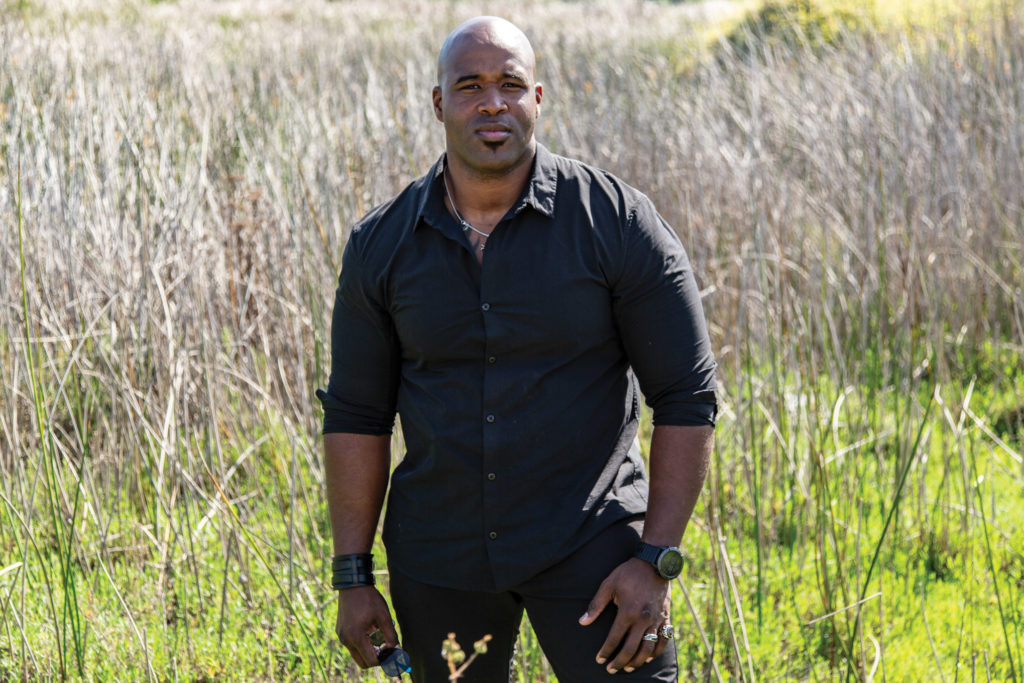
Above: To those at the top of the game, the art of protection is more than just a job, it requires a lifestyle. How else will you become skilled enough to wield the tools, to be physically able, to download all of the techniques, principles, and intellectual software required to be successful in this game? The best in the business win by the things they choose to do when they aren’t at work.
Tell us a bit about Protector Nation and Protector Symposium.
Byron Rodgers: The Protector Symposium series is giving birth to the Protector Nation. I see all the changes taking place in American culture and how you can get stuck in the middle of a riot, pulled out of your car, and beat to death. There could be an active shooter scenario in your corporate building or church this month. I see these incidents and tectonic plates in American culture changing. The goal with both of those brands is to help good people, regardless of occupation, to become more willing, capable, and prepared to deal with evil. It’s also about helping good people become more dangerous. I’m with Jordan Peterson’s school of thought insofar that a good man isn’t just a nice, sweet man. A good man is a very dangerous man who has it under control, has great discretion, and can be the backbone of a nation, his society, and family because he’s strong — that’s what I want to foster in the world. I want good people to be able to defend themselves. I want bad guys to think twice and be afraid of good people.
Protector Symposium events are going to take place throughout the year where we bring in trainers you can learn from. We have them speak on their techniques, but we’re also going to get into actual hand-to-hand, on-ground training that’ll increase your protection IQ in one event. That’s what the Protector Symposium is all about. The Protector Nation is the nation of people in the world who are naturally protectors. They are here to maintain order on our planet and bring on-scene accountability.
It’s not for tire kickers who just want to have fun. It’s for serious adults who want to learn skills as long-form education. It’ll almost be like an online university for protectors — you can get a Level 1 certification for completing stuff online, Level 2 for going to training with certain instructors, and every month there’ll be an information drop from a specific subject-matter expert on a protection skill that we think will make you more willing, capable, and prepared to bring on-scene accountability in your environment. I look forward to rolling this thing out and having various chapters and organizing it into a body of people who can serve the community as needed in the future.
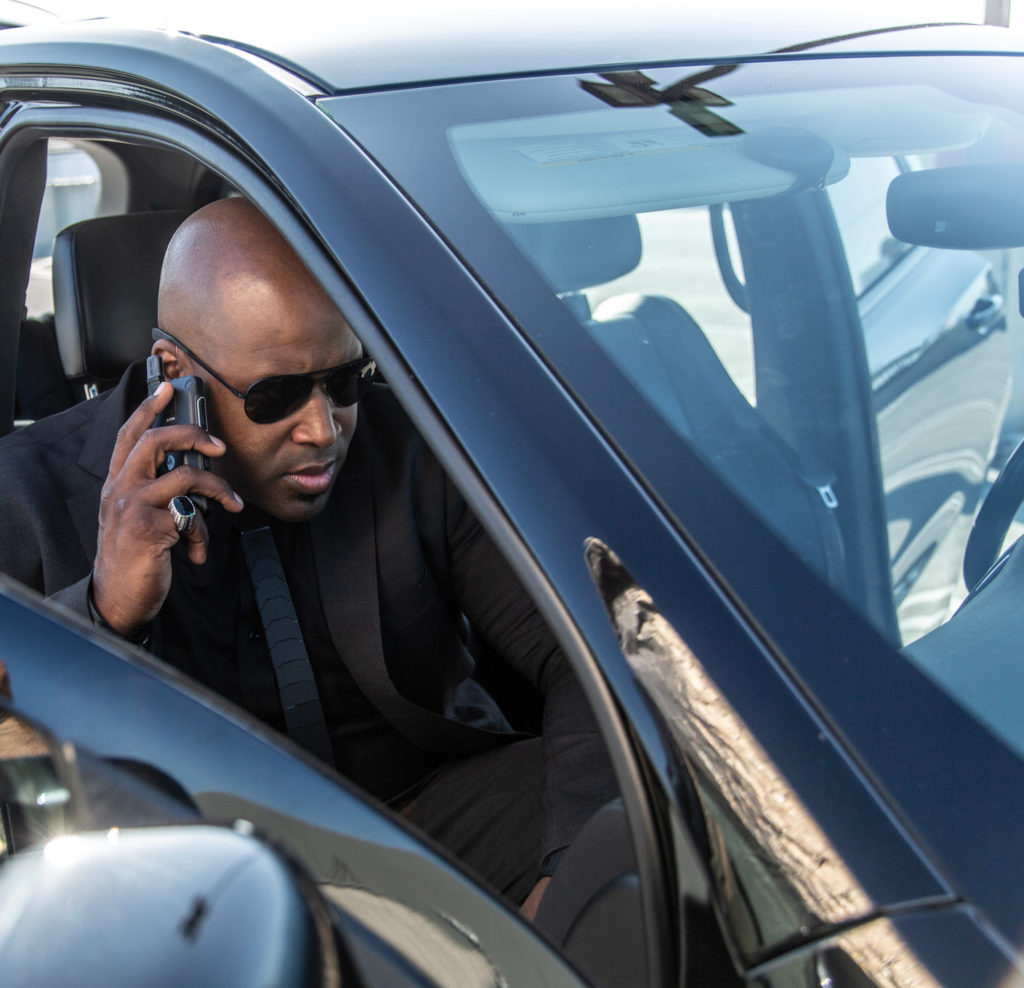
Above: You must be able to flow with your team and client while keeping the stress low and making it look like you planned for the client to shuffle the deck all along.
Do you feel self-defense is stigmatized in the United States?
Byron Rodgers: It does bring a little bit of a stigma. I’m not sure this is accurate in terms of what other people have experienced, but when someone says “self-defense” I’m picturing like a mom in her workout class with some sweats and a rape whistle and there’s an instructor who’s like, we’re gonna learn self-defense today blowing the whistle and doing some kicks. I think true self-defense is so terribly important. I commend those who go out and study it, but am really scared for them being able to find good information and good trainers with things that’ll help them in real life. Protector Symposium and Protector Nation use trainers that’ve been there, done that, and have credentials with real-world experience to back it up.
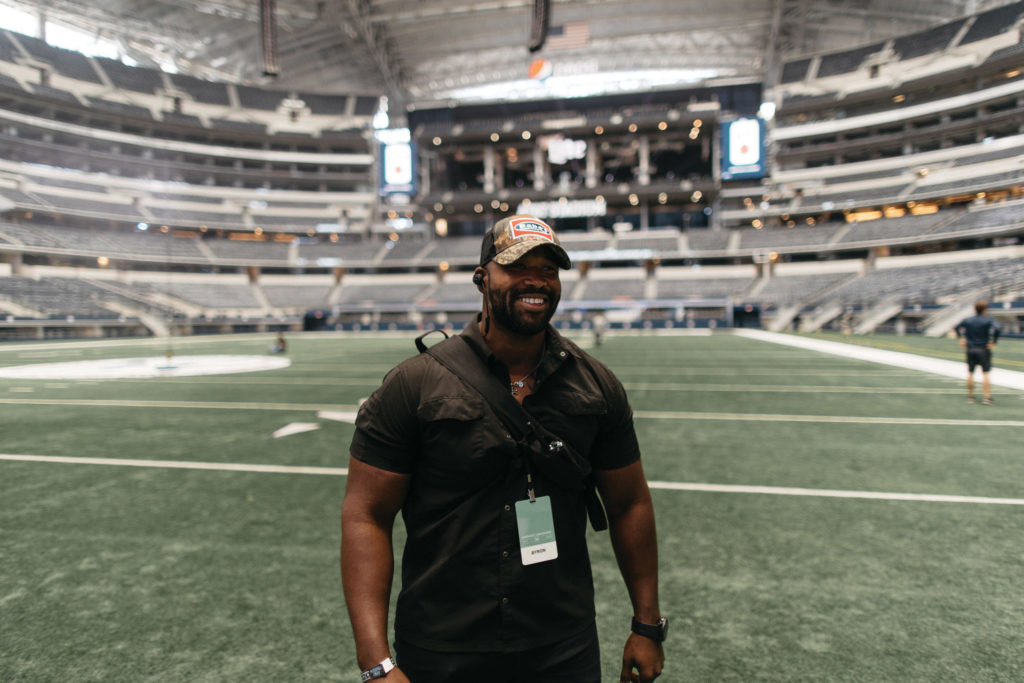
Above: “I’ve lost more friends to suicide since we’ve been out of the Marine Corps then we lost in combat because we’re still in combat — it’s just that some of us have stopped fighting. I wrote this book to help warriors find their new fight and deliberately create their new lives after they have served. Once you’ve walked through fire, little else can touch you as long as you never forget what the fire felt like.”
Given what’s happened in 2020, what security threats do you expect to increase that the average citizen should learn to protect themselves against?
Byron Rodgers: I think we’ll see more civil unrest just because it was dealt with so passively, and was even subversively validated in my opinion. I think we’ll see more looting and behavior like this. That’s something everyone should be prepared to deal with. If you’re in your car driving somewhere, you come upon people blocking the road, you’re boxed in, they might say they stand for equality, but are about to jump you because you’re the wrong color or have the wrong bumper sticker on your car. You could find yourself in an ambush situation very quickly with a high degree of danger because we all know groupthink is an issue.
The other thing I’d really warn people about is social media and the way that predators in regard to human trafficking and kidnapping are using social media. A lot of civilians are oblivious on how to behave and how not to make themselves an attractive target on social media. It’s like a candy shop. With my podcast, every single one of the people I interview who have anything to do with kidnapping or human trafficking will tell you that your biggest vulnerability is your social media, even if you think you’re a ghost and the most off-grid social media guy out there, well guess what? Someone came over for a barbecue and they’re posting pictures of your house, you, your kids, and inadvertently geo-tagging it. Now anyone who wants to find you and yours, or wants to steal your gun while you’re at work that may have been posted, can get up in your business.
Hometown: Orange, CA
Family status: Married
Childhood idol: Julius Caesar
Recommended reading list:
Favorite movie: Inception
Beer or wine? Vodka, but if I had to choose, wine.
Boxing or MMA? MMA
Favorite quote: “In the end, all that matters is what you can achieve.”
Military experience: Just a grunt turned private security professional.
Describe yourself in three words: Perspective, Driven, Fluid
URL: www.byronrodgers.com
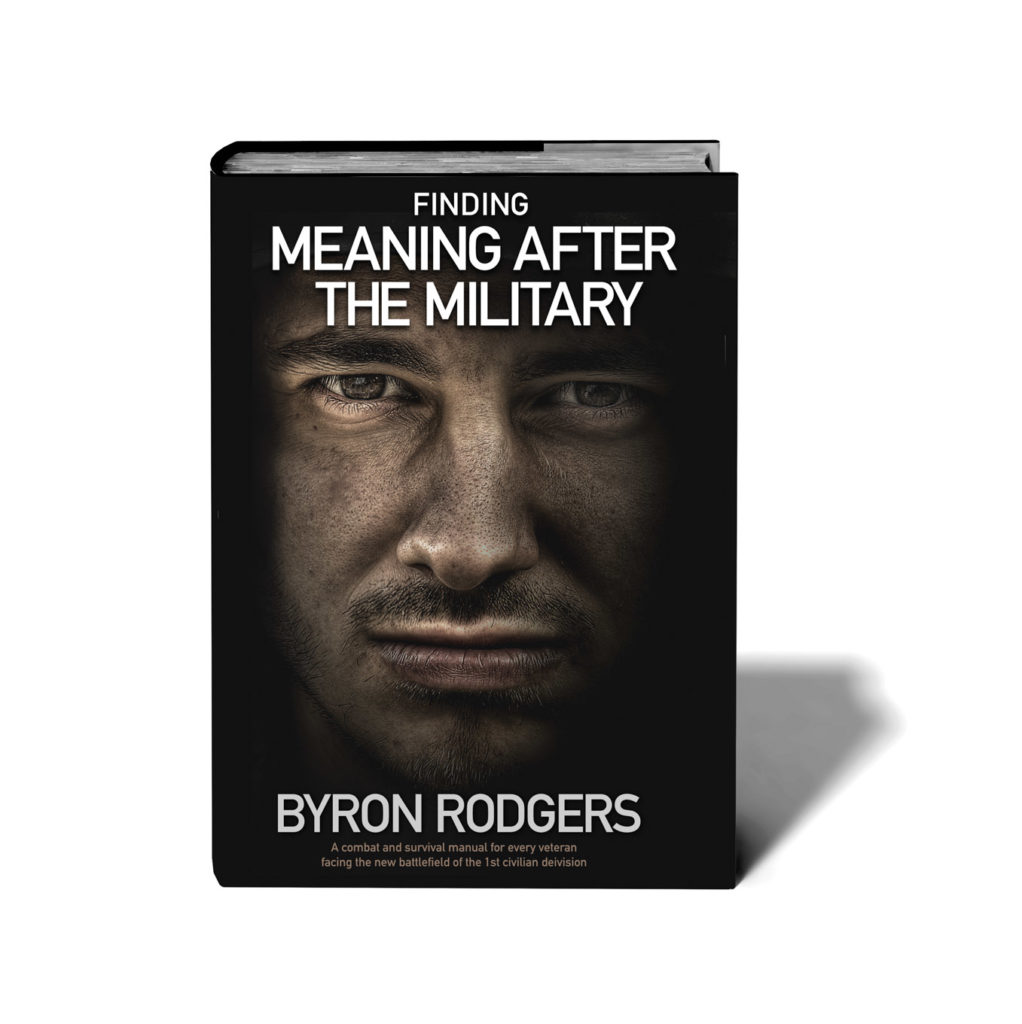
Byron Rodger's book is available HERE on Amazon for $19.99. Your purchase helps OFFGRID.
 STAY SAFE: Download a Free copy of the OFFGRID Outbreak Issue
STAY SAFE: Download a Free copy of the OFFGRID Outbreak Issue
No Comments